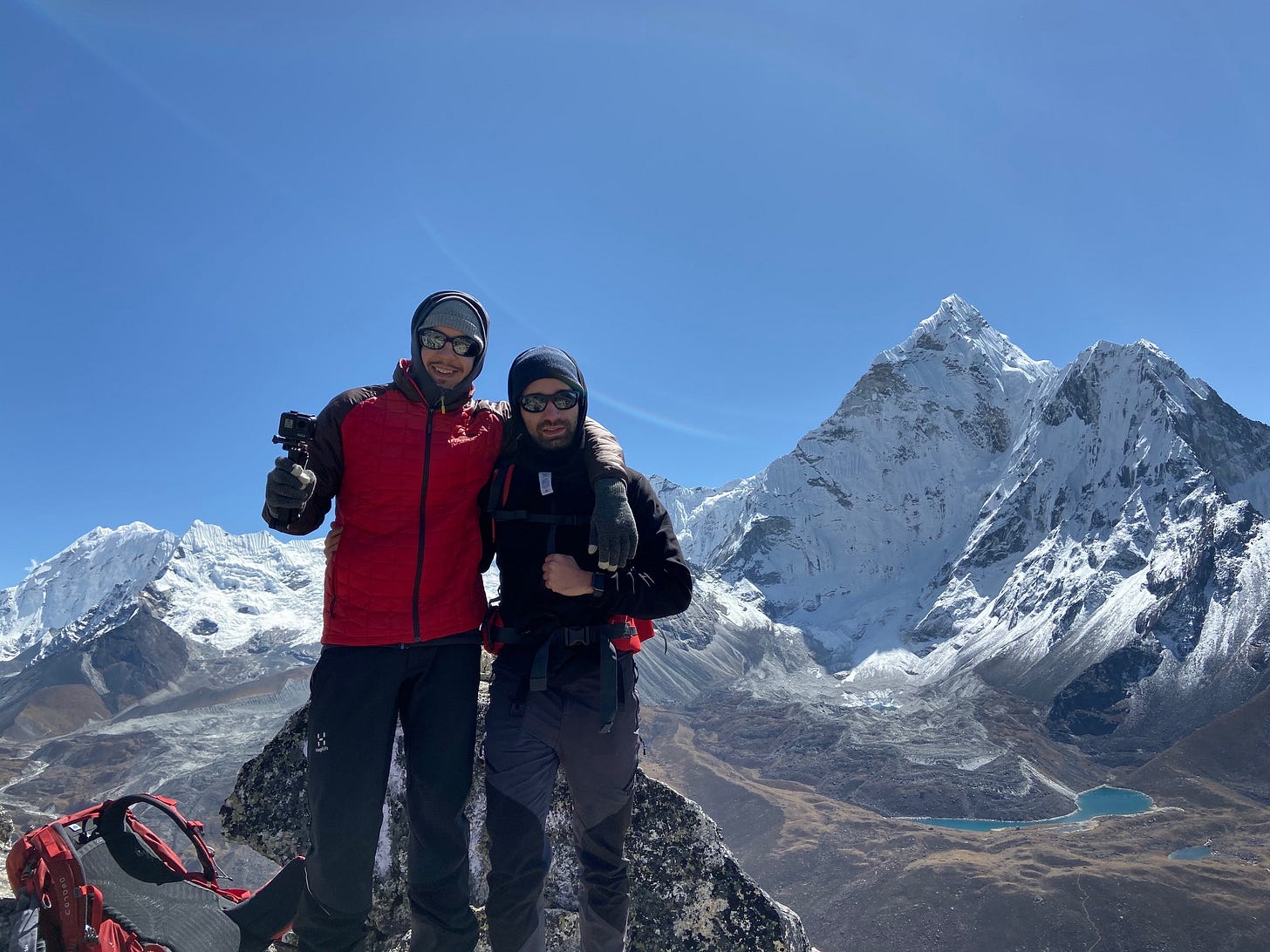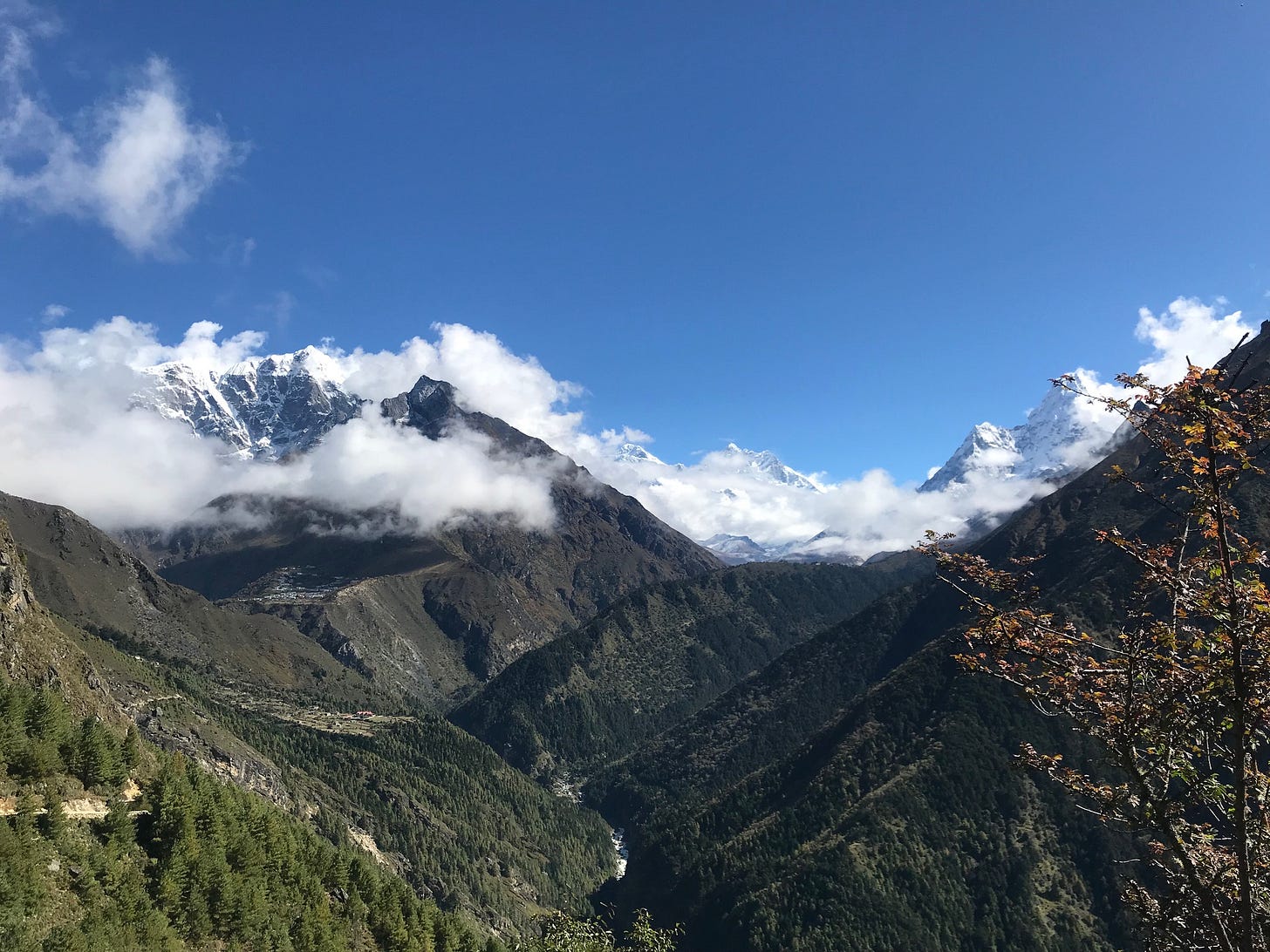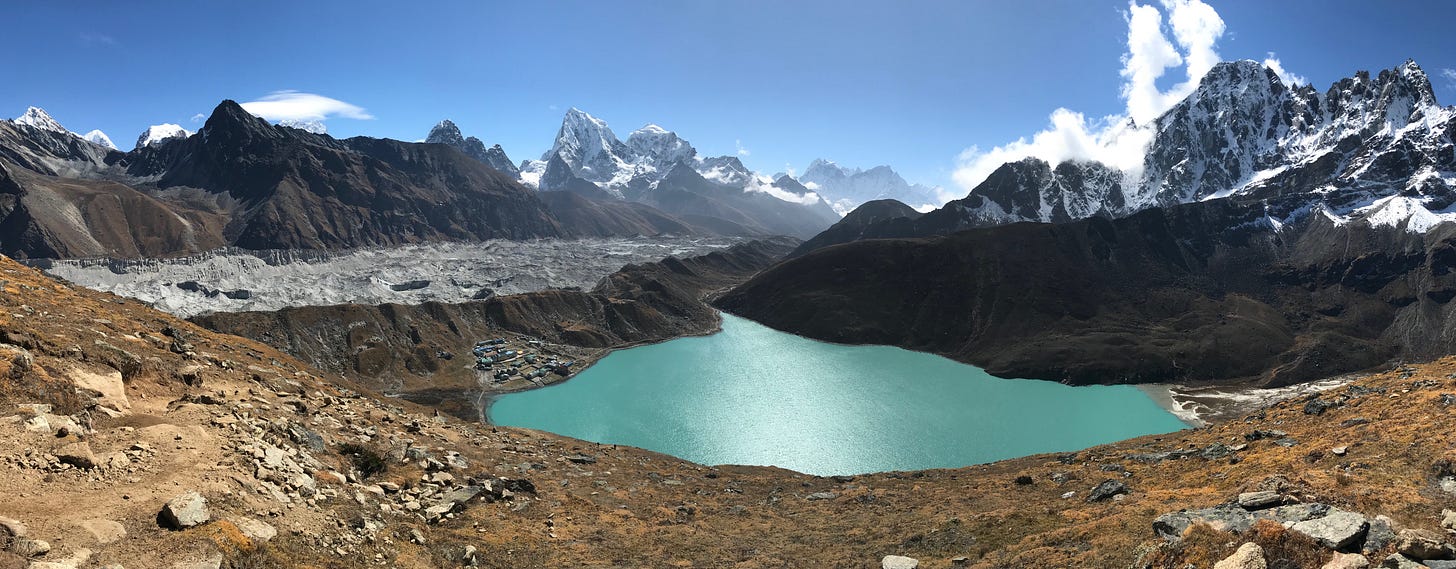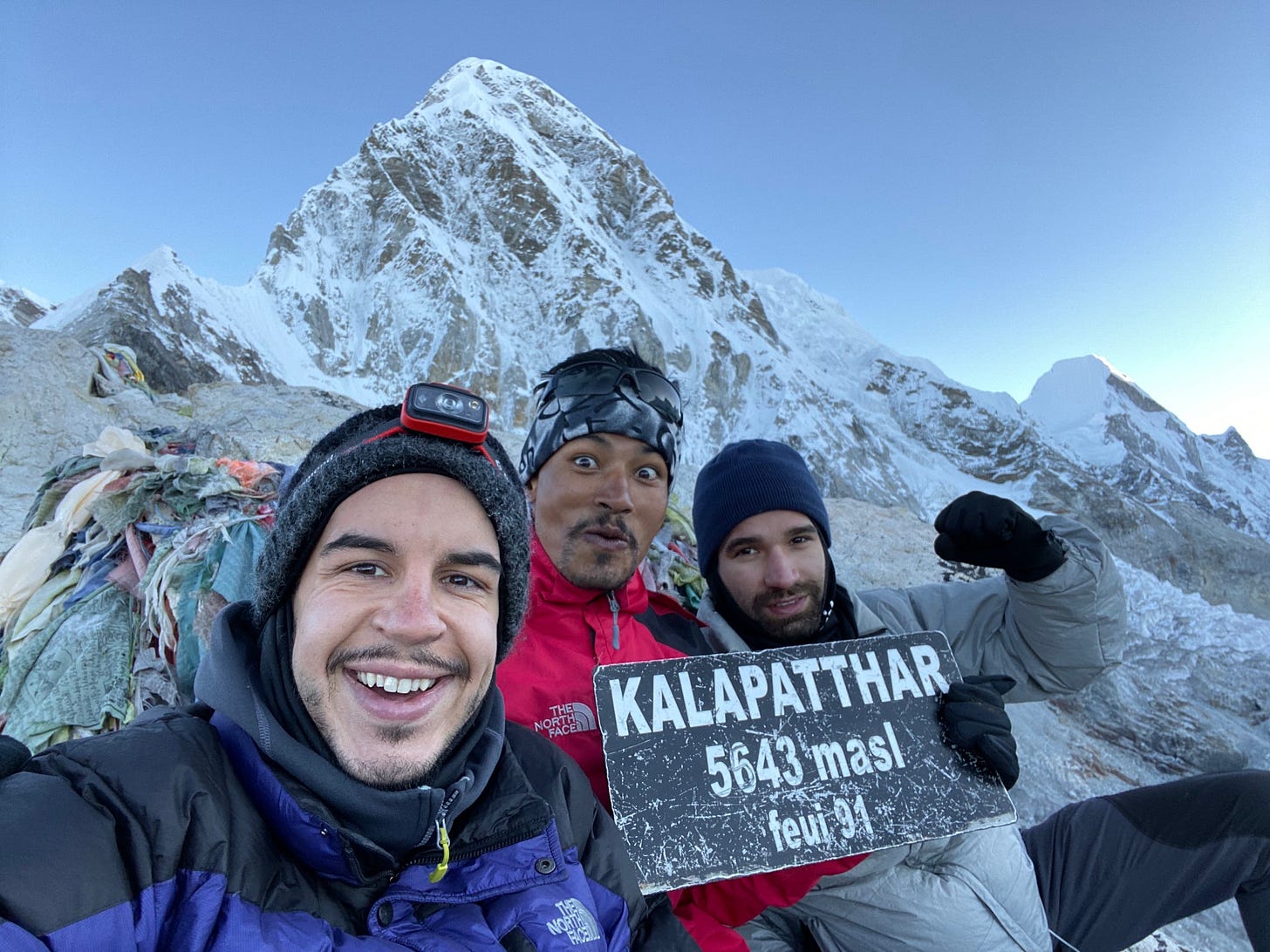Newsletter #22: 5 lessons the Himalayas taught me about entrepreneurship
12 minutes reading time. Thoughts on startups, growth, and technology 🚀
Hey there,
Today, I have decided to share what my trek to the Himalayas taught me about entrepreneurship.
I grew up hiking the mountains nearby my birthplace at every possible occasion. My grandfather was a hobbyist gold-seeker, spending most of his time up in the hills, sometimes disappearing for weeks, and just when we would start worrying he would come back with exciting stories about his adventures.
I guess that instilled in me more interest in the highlands than in the sea, where most of my peers wanted to spend their holidays. After all, the nearby mountains were a constant reminder of potential adventures as well.
Bulgaria has some of the most beautiful mountains I have ever visited, but early on, that was just an extension of home for me. You take great things for granted when they become routine.
As life goes on, I was fortunate enough to meet people who share a similar passion for hiking and call them friends. So it happened that throughout the years, a friend of mine and I have often been talking about embarking on a long journey in the Himalayas.

Combine my upbringing, my friend's common interests with a competitive personality, and you see why I was up for such a trek. A trek that would eventually conquer nearly the entire Everest region of Nepal (also known as the Khumbu Valley).
Before the trip, I had trekked a few volcanoes in Southeast Asia and several mountains in Bulgaria, which gave me the necessary confidence. Additionally, in the past five years, I exercised nearly every day, which I believed has prepared me physically.
Considering all that, a friend of mine and I decided to live up to all those conversations and pick a challenging trek. After-all, you do not have the chance to visit the Everest region every year, so my thought process was, why not choose the hardest possible trek for amateur mountain climbers?
"But there are men for whom the unattainable has a special attraction. Usually, they are not experts: their ambitions and fantasies are strong enough to brush aside the doubts which more cautious men might have. Determination and faith are their strongest weapons. At best such men are regarded as eccentric; at worst, mad. . . ." ― Jon Krakauer,
Living through this experience, I am not sure if I would make the same decision today, but I do acknowledge that a year later, such a trip does bring a lot of pride and sense of accomplishment.
We decided to go for the "Three Passes Trek," which is perhaps the most challenging high-altitude trek in the Khumbu Valley. We chose the trek for the following reasons: a) it is super damn hard, b) we were able to pass by the Everest Base Camp and cross it out of our bucket lists, c) the trek is long and full of breathtaking views allowing us to pass by Kongma-La, Cho-La and Renjo-La passes, each having an altitude of more than 5300 meters.

I clearly remember the day I left Jakarta for Kathmandu. Since the trek we chose was supposed to take nearly an entire month, I was working hard to ensure the team at Greenhouse is well prepared for my absence. To be honest, leaving Greenhouse behind, worried me more than what could happen trekking across the highest mountains on the planet. Luckily, I have an incredibly supportive team and management, and that encouraged me to make the decision.
With a mixed sense of exhaustion and excitement, I boarded the plane, preparing for an experience of a lifetime and a lifetime experience I got.
I soon came to realize that once you cross the 3000 meters mark, the experience is primarily about enduring pain and struggle. For the first time in my life, I faced a near-death experience, twice.
First, on the way up, when we reached Namche Bazaar, the central trading hub for the Kumbu region at an altitude of 3440 meters, I got severely hit by altitude sickness.
The second time happened at Gokyo Ri, perhaps the most beautiful area in the Himalayas, where I got very ill with a high fever.

I do not want to go in detail for both cases, but it was an unpleasant and frightening experience.
Despite all that, the trip was terrific, and it triggered five reflections that in my view, apply quite well to entrepreneurship:
While it's essential to have significant objectives it's the small, gradual, and consistent steps that actually move you forward - there are times in entrepreneurship when you feel that you do not want to continue, and giving up on whatever you are doing seems like a good idea. Yet, what my experience taught me is that no matter how small a step you take, it adds up to the previous one and pushes you further. The cumulative incremental progress gains momentum, and before you realize it, you have overcome the obstacle and reached the top.
Although most often plans may go sideways, planning is the difference between success and failure when taking on a big challenge - I can't list all times when my plans in business did not work out, yet, planning gives you a) the necessary confidence to meet the unknown future b) prepares you mentally for the worst possible outcomes, c) gives you an edge in comparison to people who did not plan at all.
If it doesn't feel like you are failing, you are not pushing your limits - I think that's pretty straightforward, as I quoted in a previous article "Genius is the infinite capacity for taking pains."
We grow most under challenging situations; in such conditions, it often feels like we are failing, but that won't be true unless we give up - strategically positioning yourself in stressful circumstances may sound counterintuitive. Still, nothing gives you more life-changing lessons than such experiences.
“The more improbable the situation and the greater the demands made on [the climber], the more sweetly the blood flows later in release from all that tension. The possibility of danger serves merely to sharpen his awareness and control. And perhaps this is the rationale of all risky sports: You deliberately raise the ante of effort and concentration in order, as it were, to clear your mind of trivialities.” ― Jon Krakauer
You will always meet people who are faster or slower than you, in everything you do. It's essential to find your own pace and ignore the noise - comparing yourself to other people is often misleading. We all have unique and different circumstances that play a massive role in our upbringing, immediate environment, and progress against our goals. When I was going up the hill I met people 30 years older than me that were much faster, and people who were in their early twenties that were slower. There was a powerful lesson there, ignore the noise, focus on your pace.

Resources worth checking out:
📝YC’s Essential Startup Advice | Geoff Ralston and Michael Seibel / - A lot of the advice we give startups is tactical; meant to be helpful on a day to day or week to week basis. But some advice is more fundamental. We’ve collected here what we at YC consider the most important, most transformative advice for startups. Whether common sense or counter-intuitive, the guidance below will help most startups find their path to success.
🎥 Runnin' Down a Dream: How to Succeed and Thrive in a Career You Love / Bill Gurley / Sep 2018 - Bill Gurley has spent over 15 years as a General Partner at Benchmark Capital and is one of the most respected VCs out there, this talk represents a summary of what you need to do to build a career you love.
📝 21 Things I Wish Someone Told Me as a Young Founder | Noah Jessop - In the course of starting two companies, I’ve received a lot of advice. Now I work at a VC firm that has backed companies like Uber, Cruise, BuzzFeed, and Thredup and I’m asked to give advice. There’s no “secret manual” to building a company. No “one easy trick.” No roadmap. No two companies are ever the same.
A quote worth remembering:
💬 George Mallory, a mountaineer who led early British expeditions to Mount Everest in the 1920s, on the joy of climbing:
“People ask me, ‘What is the use of climbing Mount Everest?’ and my answer must at once be, ‘It is of no use.' There is not the slightest prospect of any gain whatsoever. Oh, we may learn a little about the behavior of the human body at high altitudes, and possibly medical men may turn our observation to some account for the purposes of aviation. But otherwise nothing will come of it. We shall not bring back a single bit of gold or silver, not a gem, nor any coal or iron… If you cannot understand that there is something in man which responds to the challenge of this mountain and goes out to meet it, that the struggle is the struggle of life itself upward and forever upward, then you won’t see why we go. What we get from this adventure is just sheer joy. And joy is, after all, the end of life. We do not live to eat and make money. We eat and make money to be able to live. That is what life means and what life is for.”
A book recommendation:
📖 Into Thin Air: A Personal Account of the Mount Everest Disaster by Jon Krakauer
A book that details people's quests to conquer nature, to see nature as something to be conquered. It's also another great cold-weather read, to make you realize that, really, it's not so cold out after all. Some people hate it, others love it, but everyone eventually reads it.
Positive news worth sharing:

Internet access has become a modern human right. It’s needed to access basic public services, to stay informed, to communicate. Mobile data has often been unaffordable in lower-income countries. But that’s changing. New national broadband plans. Expansion of 3G and 4G coverage. Number portability. Millions of people getting connected, cheaply.
Check out the source here.
Onward and upward 🚀




